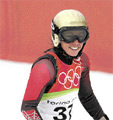 SESTRIERE, Italy - Almost everyone who meets Chirine Njeim for the first time, looks into her blue-green eyes and says, "You're from Beirut?"Eventually, they see the skis and snow pants and boots and red winter jacket with the word Lebanon across the back, and say, "An Olympic skier from Lebanon?""A lot of people are confused," Njeim said. "I can understand that."
SESTRIERE, Italy - Almost everyone who meets Chirine Njeim for the first time, looks into her blue-green eyes and says, "You're from Beirut?"Eventually, they see the skis and snow pants and boots and red winter jacket with the word Lebanon across the back, and say, "An Olympic skier from Lebanon?""A lot of people are confused," Njeim said. "I can understand that."
Lebanon, land of camels and sun and sand, also has mountains, snow, six ski resorts and light-eyed 21-year-old Njeim. She learned to ski at age 3, became good enough to compete internationally and developed anorexia in her zeal to be even better.Now recovered and up to 130 pounds - 46 more than her one-time dip to 84 preceding the Salt Lake City Olympics - Njeim (pronounced nJIM) is one of two Turin Olympians representing Beirut. The other, Patrick Antaki, is a 41-year-old skeleton slider who lives in Plano, Texas, and has U.S.-Lebanese citizenship.Njeim carried the Lebanese flag as the only Olympian from her country at the 2002 Winter Games, when she was starting to recover and barely weighed 100 pounds and was "terrified that I'd fall and trip with it," she said.
By Mayssa el khazen, Islamic radicalism first erupted in Lebanon following the 1979 Iranian revolution and 1982 Israeli invasion. These two events marked the start of Hizbullah, a movement that would acquire the support of the Lebanese Shiaa and that would take on a crucial and defining post in Lebanese politics. Hizbullah, meaning the Party of God and backed by Iran, emerged to become an important and pivotal force in Middle Eastern politics in general and particularly in Lebanese society. Amal, a Shiaa movement which means
BEIRUT – Camps of the 14 March called on President Emile Lahoud to resign by March 14. They called on the president "to …
BEIRUT – Camps of the 14 March called on President Emile Lahoud to resign by March 14. They called on the president "to …
Khazen History


Historical Feature:
Churches and Monasteries of the Khazen family

St. Anthony of Padua Church in Ballouneh
Mar Abda Church in Bakaatit Kanaan
Saint Michael Church in Bkaatouta
Saint Therese Church in Qolayaat
Saint Simeon Stylites (مار سمعان العامودي) Church In Ajaltoun
Virgin Mary Church (سيدة المعونات) in Sheilé
Assumption of Mary Church in Ballouneh
1 - The sword of the Maronite Prince
2 - LES KHAZEN CONSULS DE FRANCE
3 - LES MARONITES & LES KHAZEN
4 - LES MAAN & LES KHAZEN
5 - ORIGINE DE LA FAMILLE
Population Movements to Keserwan - The Khazens and The Maans
ما جاء عن الثورة في المقاطعة الكسروانية
ثورة أهالي كسروان على المشايخ الخوازنة وأسبابها
Origins of the "Prince of Maronite" Title
Growing diversity: the Khazin sheiks and the clergy in the first decades of the 18th century
Historical Members:
Barbar Beik El Khazen [English]
Patriach Toubia Kaiss El Khazen(Biography & Life Part1 Part2) (Arabic)
Patriach Youssef Dargham El Khazen (Cont'd)
Cheikh Bishara Jafal El Khazen
Patriarch Youssef Raji El Khazen
The Martyrs Cheikh Philippe & Cheikh Farid El Khazen
Cheikh Nawfal El Khazen (Consul De France)
Cheikh Hossun El Khazen (Consul De France)
Cheikh Abou-Nawfal El Khazen (Consul De France)
Cheikh Francis Abee Nader & his son Yousef
Cheikh Abou-Kanso El Khazen (Consul De France)
Cheikh Abou Nader El Khazen
Cheikh Chafic El Khazen
Cheikh Keserwan El Khazen
Cheikh Serhal El Khazen [English]
Cheikh Rafiq El Khazen [English]
Cheikh Hanna El Khazen
Cheikha Arzi El Khazen
Marie El Khazen